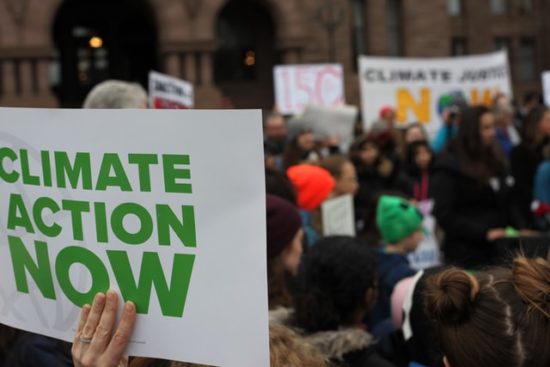Leeds Climate Change Citizens' Jury: Recommendations Launch Event
Professor Paul Chatterton, School of Geography, Faculty of Environment
Rapid Action Fund Project

The Leeds Climate Change Citizens Jury is a diverse group of 25 randomly selected people from across the Leeds City Region, brought together for nearly 30 hours of deliberation, in an attempt to answer the question, 'What should Leeds do about the emergency of climate change?' There was a specific attempt to support Leeds City Council's Big Climate Conversation in the wake of it's 'Climate Emergency' declaration.
The members of the 25 strong citizens jury were selected through a stratified random sampling process led by the NGO, The Sortition Foundation. They reflect the diversity of the Leeds City Region. The group has met over nine sessions to share opinions and experiences, hear from a diverse range of outside experts (witnesses) including academics, before writing a set of carefully considered and priorities recommendations for actions.
The group of citizens has produced a carefully thought through set of recommendations. This funding supports a launch event to enable their recommendations to be widely shared with stakeholders and members of the public across the city region. A Leeds Climate Change Citizens Jury launch event will bring together public, private and voluntary sector representatives to hear and better understand both the process of engagement and the group's recommendations. In order for this event to be led by the citizens themselves, the jury will meet for two facilitated sessions prior to the launch event. In keeping with good practice in deliberative democracy processes, all members of the jury are paid a small fee to recognise their expertise and commitment. This public launch of the jury recommendations will serve to build new and enhanced relationships between the public and agencies involved in addressing the emergency of climate change.
For more information read the Launch Event Report
Professor Paul Chatterton can be contacted by email: P.Chatterton@leeds.ac.uk
Previous Projects:
Climate Emergency and Civic Co-production
Knowledge Exchange Fellowship
As cities around the world declare climate emergencies and produce zero-carbon roadmaps, it is essential that citizens have resources so they can understand and coproduce solutions. The ‘Climate Emergency and Civic Coproduction’ project emerged to respond to this context. It is a joint partnership between Cyclops Pedal Power CIC and Paul Chatterton (Professor of Urban Futures and author of www.unlockingsustainablecities.org). It will use interactive models of urban streets and neighbourhoods to explore positive and practical actions that can be taken to create liveable and sustainable communities by 2030. Drawing directly on Unlocking Sustainable Cities, the models will foreground social and economic justice, allowing participants to co-create a vision of inclusive climate action. Each model ‘block’ will be assigned scores for how well it performs across a range of environmental, economic and social categories. Participants will also be able to make their own models and assign scores and evidence. This project is both an educational tool and campaigning resource, enabling diverse participants to have direct societal impact by coproducing ways to rapidly reduce emissions. Through engagements with researchers at University of Leeds and workshops with university and public audiences, the project team will refine the model and create supporting resources, launched during the Leeds 2020 International Festival. The aim is that a more informed, connected and motivated citizenry can support rapid and inclusive climate action.
Mapping the urban commons for social action
Responsive Mode Impact Fund
This project emerges from the Leeds City Lab (LCL) project, which explored how city teams could use co-production to develop better city wide solutions to key economic, environmental and political issues. This current project involves members of LCL in the co-production of an ‘urban commons map’, an online open data tool designed to promote neighbourhood social action and improved community solutions to local concerns and problems.
Preparatory work has been undertaken to establish a mapping prototype using open datasets from Leeds City Council. During preparatory work, LCL used Community Philosophy methodology to think critically about meaning and value in relation to ‘The Commons’ and identified the importance of seeing ‘Urban Commons’ as a participatory, social process as much as a set of tangible, physical, entities and outcomes. As such ‘urban commons’ are concerned with how people interact with and utilise urban assets and infrastructures to mutual benefit. This methodology will be used during the project to support thinking about how residents can use the mapping resource to scope and realise social and community action of benefit to their neighbourhoods.
This project is timely because thirty-five neighbourhoods in Leeds are currently engaged in neighbourhood planning exercises. This follows the Localism Act, 2011, whereby “statutory Neighbourhood Planning enables communities to draw up Neighbourhood Plans for their area and is intended to give communities more of a say in the development of their local area”.
The mapping tool will be further developed by Leeds ODI. It will then be tested in 3 neighbourhood settings in Leeds that are currently engaged with neighbourhood planning, drawing on the support of Voluntary Action Leeds and Leeds City Council’s community hubs. The aim of this work with specific neighbourhoods is to (i) provide communities with information on assets available in their neighbourhoods; (ii) use local knowledge to collaboratively refine and add further useable information to the maps; (iii) further develop the online map tool based on this feedback; (iv) develop a process whereby communities can use the mapping process in their own neighbourhood’s to promote social action around identified assets that can yield tangible neighbourhood solutions; and (v) provide an impactful tool and social process to enable specific neighborhoods draw up and increase the impact of their Neighbourhood Plans.
